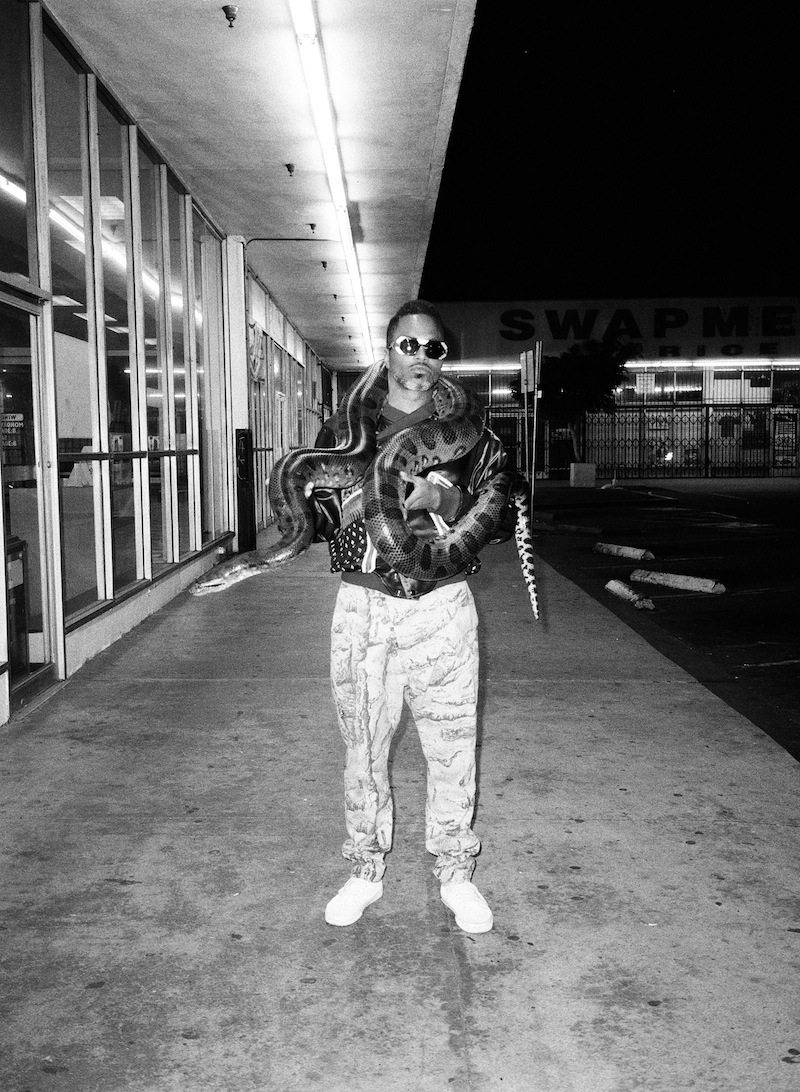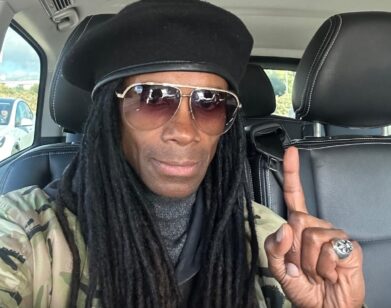Inhabiting Shabazz Palaces

ABOVE: SHABAZZ PLACES’ ISHMAEL BUTLER. PHOTO BY PATRICK O’BRIEN-SMITH. CLOTHING BY NEP SIDHU FOR PARADISE SPORTIF.
For three short years in the early ’90s, Digable Planets carved out a space just to the left of the mainstream hip-hop world. Their sound was a potent and jazz-leaning concoction and their breakthrough, the chart topping “Rebirth of Slick (Cool Like Dat)” felt like a breath of fresh air amidst a cresting wave of gangsta rap. Nowadays, it’s hard not to draw similarities between the group and Shabazz Palaces, the Seattle-based duo of Tendai Maraire and former Digable emcee Ishmael Butler. Like Butler’s former project, Shabazz doesn’t concede an ounce of its vision to any larger commercial landscape. In fact, on their latest Butler seems to be actively pushing against it.
Lese Majesty, out today via Sub Pop, is titled after a French phrase that essentially means a violation of the reigning power, and over the course of the album’s 18 tracks and seven suites, Butler and Maraire lodge a fluid, otherworldly attack. The album is filled with drifting sonic experiments—from the expansiveness of opener “Dawn in Luxor” to the glitchy synths of lead single “#CAKE”—that swirl around impressions of spirituality, mysticism, and science fiction. But at the heart of the matter is Butler, whose lyric sheets are filled with mindful war cries against an increasingly narcissistic, money-hungry, and tech-dependent world. We recently caught up with the man his friends lovingly call Ish in Los Angeles to talk music, numerology, and the pitfalls of staying connected.

ALY COMINGORE: Okay, what is the story behind the snake photos? My friend and I were saying they might be the best press shots we’ve ever seen.
ISHMAEL BUTLER: [laughs] You know, my bro Nep [Sidhu] sent me this pic. His pops was back in Punjab, where they’re from, and there was a dude just walking down the street like that. His dad took a picture on his iPhone and sent it to Nep, Nep sent it to me and I was like, “Oh, that’s filthy. I’m doing that shit.” I was in L.A. working on the KENZO joint with Patrick O’Brien-Smith, who took the pictures, and we were talking during downtime and I was like, “Man, I want to do that.” I’m from Seattle. I wasn’t even thinking in L.A. terms, but he was like, “Yeah, that’s nothing. We can do that shit today.” I called up Hollywood Animals, and they sent me an email with like 50 kinds of snakes that we could rent. We ended up at a shopping mall in the hood. People were walking by and just tripping out. But I got the idea from Nep’s dad walking down the street in Punjab, where cats are doing that shit for real. Nep also made all the clothes I’m wearing in the pics.
COMINGORE: He did all of the artwork for the record too, right?
BUTLER: Yeah.
COMINGORE: Is there a lot of back and forth when you guys work together, or does he just kind of do his thing?
BUTLER: The funny thing with Nep is whatever he turns in is amazing. When we collaborate I might give him some super cryptic and abstract vision of some idea and he always comes back with something very specific to my imagination, something that I couldn’t even put into words. We have a real kinetic undercurrent to our relationship. We just connect and I think that’s why it’s so good.
COMINGORE: Are you a believer in numerology?
BUTLER: Are you?
COMINGORE: Not particularly. But I was going to ask you whether or not there was a significance to the album having seven suites.
BUTLER: There definitely is. The first two CDs have seven songs on each of them, and Black Up and Of Light are all seven letters. I always try to keep stuff to seven when it comes to the titles and the music and stuff like that. I wanted to keep it going on this record, so the seven suites had a lot to do with that.
COMINGORE: Why seven?
BUTLER: It’s all of the characteristics of the seven and the numerology behind it—all of that stuff. I was also in the Nation of Five-Percenters when I was a little bit younger and they believe seven is the number of God. And it was my number in Little League basketball. [laughs] It was always my number.
COMINGORE: How did you settle on calling the album Lese Majesty?
BUTLER: You know, when I discovered the phrase about a year ago, I was surprised I hadn’t heard it before. I grew up in a pretty revolutionary household, both socially and in that my parents read a lot and they tried to impart on me the importance of having a worldview. It seemed like a goldmine with this whole me-mania thing that’s going on, people declaring themselves kings or ruling over domains based how many followers you have or how many likes you get. I just felt like this album could be a sonic attack on all of that. I want to comment on this new social government that’s ruling over us and basically just spit in the face of all of it. But I don’t want to do it heavy-handedly. I don’t want to be all, “Oh man, Twitter,” because I don’t really feel like that. But I do see that we’re all kind of being herded into these very small places.
COMINGORE: By social media?
BUTLER: Yeah. They’re making it seem like we’re exercising our individuality and our creativity, but that’s not really what’s happening. Everybody that kind of uses this stuff to get followers, get record sales, basically to make money—I just wanted to call bullshit on all of that in my own way. I don’t want to make it feel elite. I’m not better than people on Twitter or people on Facebook. That’s not what it’s about. I do see things for what they are, though.
COMINGORE: How do you mean?
BUTLER: To me it’s kind of embarrassing as a Western human being to say that what we’ve done with “technological advancements” has basically been this deluge of social media and teaching ourselves and each other and our kids that it’s somehow important or necessary. That seems like an epic slipup and a failure on our part.
COMINGORE: There’s a line on “They Come in Gold” about vanity that seems to speak to that.
BUTLER: Yeah. Vanity is so superficial. It doesn’t provide the grounds for progress. I’ve been thinking a lot about this notion that if it’s new therefore it’s better, but that’s not even remotely true and it’s making us turn over and forget about so many really substantial things. Take Frank Lloyd Wright. His shit is always going to be new because of where he came from: Where his mind was coming from was new, whereas all these new buildings that are going up aren’t worth a shit, not design-wise, not material-wise. This whole idea that everything new is better is really poisoning us, and it’s hard to see a way back from it.
COMINGORE: Not to mention the impact it’s having on memory retention.
BUTLER: Is that real to you, though? Because that fucks me up a lot.
COMINGORE: Absolutely. We have boundless knowledge at the tips of our fingers constantly, so there’s no need to remember anything.
BUTLER: I really believe that. Our minds are just getting fat from not exercising them, and you know you have this safety net so it’s just like, fuck it. And for what? I reject that it’s even technology. It’s one aspect of it, but is it an advancement in any way? I don’t really get what’s advancing. We’re getting faster at uploading pictures? Who gives a fuck? Look what we’re losing. We’re losing the strength of our minds.
COMINGORE: And we have a generation coming up after us that never really had that strength to begin with. I wanted to ask, did music factor pretty prominently into your childhood?
BUTLER: Yeah. The story I like to tell about when Tendai and I first started hanging out was we both knew and remembered all these commercials from when we were kids because of the jingles, because of the songs. From early on, like single-digit age, I was paying attention to music in a way that I wasn’t noticing then, but later on in life I realized I was really into it. I don’t even know where to begin and end in describing how much it is to me. Whatever force of life that’s required of me, I think it’s that. I was in middle school jazz band. I started off on alto saxophone and kept playing, but I’ve been in groups and bands since middle school. I see and feel life in rhythm and harmony and melody. That’s just how it is. I don’t know anything else, really. And don’t want to.
COMINGORE: What do you think you get out of Shabazz that you didn’t get out of those other groups?
BUTLER: Without sounding cliché, music is like air. It provides for me. I don’t necessarily look for what I can get out of it. It’s a compulsion. I’ve always gotten out of it everything, but what I’m able to put in has changed just because I have different outlooks on life now, and a little more skill on certain instruments or programs. But what I’ve gotten out of it has pretty much always been the same. It’s everything. I feel like I’m an explorer, a frontiersman if you will, and I’ve been able to satisfy that desire in me through music. I’ve continued to meet people who challenge me and inspire me as friends. I don’t even know how to even quantify it in words. I’ve been very fortunate.
LESE MAJESTY IS OUT TODAY VIA SUB POP RECORDS. FOR MORE ON SHABAZZ PALACES, VISIT THEIR WEBSITE.






